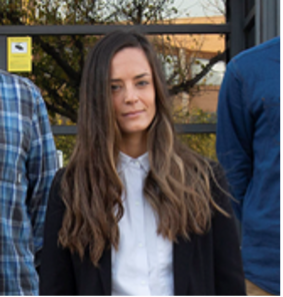As part of our newly refurbished website, we would also like to launch a new series of posts through which we would like to introduce researchers and projects that focus on the topic of wastewater-based epidemiology. In our very first edition of “Meet & Greet” we have the great pleasure to introduce to you Marina Celia Campos Mañas from the University Jaume I (UJI) in Castellon de la Plana.
Marina Celia Campos Mañas
Biography

Marina graduated in Chemistry by the University of Almería, Spain (UAL) back in 2014. After that, she did her PhD at the UAL, which she obtained in 2019, in the research group Environmental analysis and water treatment. Her doctoral thesis focused on analytical techniques for environmental water analysis and, specifically, on liquid chromatography-tandem mass spectrometry analysis of organic microcontaminants to evaluate water contamination and water reuse. She did an international research secondment of five months at the Center of Environmental Mass Spectrometry in Colorado (USA). During her postdoc, she has been working on analytical methods and strategies to quantify organic microcontaminants in environmental waters at UAL, as well as within the European project EUSEME- Europe-wide sewage analysis to monitor emerging drug problems (at UJI). Through a contract of excellence, she currently holds a position at the UJI and works, among other things, on wastewater-based epidemiology (WBE).
“How and when did you get to learn about wastewater-based epidemiology?”
I started working on wastewater-based epidemiology at the end of 2020, within the framework of the EU project EUSEME led by the SCORE group. At that time I was doing my second postdoc at the University Jaume I (UJI) and was involved in the work package led by Dr. Lubertus Biljsma.
“What is your current research focus?”
On the one hand, I’m currently working on the analysis of wastewater to determine drugs of abuse at the European (part of the SCORE network’s activities) and national levels (ESAR-net, Spain) to carry out wastewater-based epidemiology. On the other hand, I’m also doing research on the determination of pesticides, antibiotics, and other pharmaceuticals in environmental and biological samples. The goal, in this case, is for instance to calculate human exposure to pesticides.
“What’s the most exciting part of your job / what motivates you?”
What I like most about my job is studying the impact that human activities have on the environment. In addition, I find it very interesting to apply methods used to measure drugs of abuse in wastewater to be able to estimate consumption and complement other sources of information.
“What are your goals for the future?”
In the future, I would like to pursue research and apply the things I have learned so far. In addition, I would like to expand my line of research to measure the toxicity and impact that emerging pollutants have on the environment.
